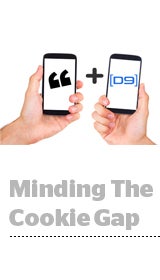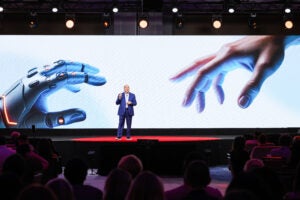 Flashtalking is on a quest to become what company CEO John Nardone calls a “single point of truth.”
Flashtalking is on a quest to become what company CEO John Nardone calls a “single point of truth.”
It’s why the NYC-based ad server decided to buy Device[9], a small cross-device recognition company located in Hamburg, Germany.
The acquisition, announced Tuesday, was a mostly stock deal. Nardone declined to share the sale price.
At its core, Device[9] is a probabilistic solution that eschews cookies as the connective tissue between different devices. The company’s algorithm evaluates a variety of different non-PII signals – everything from OS, browser settings, screen resolution and plug-ins to slightly more obscure characteristics like CPU data, battery information and time zone – to identify users across desktop and mobile.
The resultant device ID becomes the basis for anonymized retargeting, message sequencing and fractional attribution, whereby advertisers and agencies can get a better picture of which partners are most effective and which media has the best performance across certain channels.
“There are a number of situations where cookies are limited in their ability to track a conversion back to the ad exposure or the interaction that led up to it, which is particularly acute in mobile,” said Nardone, who sold his previous company, [x+1], to Rocket Fuel in summer 2014 and joined Flashtalking a little less than a year later.
“Using device recognition gives you a much cleaner data set to build attribution models and have a better signal to drive the creative interaction,” he said.
In terms of accuracy, Nardone claims “over 90%” based on internal tests in which Device[9]’s probabilistic cross-device matches were compared to a deterministic truth set. Both Tapad and Drawbridge claim 90%-plus accuracy of their device graphs, according to recent Nielsen studies.
Flashtalking plans to focus on closing the so-called “cookie gap” between apps and the mobile web before turning its attention to desktop connections, Nardone said. The ultimate goal is to transform the ad server into a one-stop shop for attribution, fraud and viewability management and, of course, data-driven creative.
“It’s just too hard for advertisers right now with all of the third-party tags they have to wrap around the ad server,” Nardone said. “We want to wipe all of that away and put everything into the ad server so it takes the overhead and the monotony out of executing the mechanisms of digital advertising.”
But one function that won’t end up housed within the Flashtalking ad server stack is media buying – the opposite of the Google/DoubleClick model. Cross-device data providers Tapad and Drawbridge notably sell media as well.
AdExchanger Daily
Get our editors’ roundup delivered to your inbox every weekday.
Daily Roundup
“Our pursuit of cross-device mapping is as an infrastructure provider,” Nardone said. “We’re not in the business of competing with our DSP partners or our agencies who are doing media buying. We don’t need to play that game.”
Flashtalking also differentiates itself from another titan of ad serving and media sales – Facebook and its Atlas ad server. Whereas Facebook famously tends a walled garden, Flashtalking plans to make its raw log file server data available to agencies and brands if they want to do their own analysis on it or use the insights to inform other campaigns.
There’s a good reason why the big platform players like Facebook aren’t willing to share that data with their ad partners – sensitive PII requires that they play by different rules – but the net result is the same, namely less value for the advertiser, Nardone said.
“If we don’t provide device IDs and tracking at the log level, we’re essentially undermining the value that the agency can bring to the party,” he said. “And that’s not something we want to do.”
All of Device[9]’s employees, which Nardone described as “a small handful,” will be coming along with the deal, including CTO and co-founder Detlef Lorenz. Founded in 2014, Device[9] never took outside funding, having bootstrapped itself through cash infusions from friends, family and a few angels.
Device[9]’s Hamburg office will be Flashtalking’s second location in German. In addition to Cologne. Flashtalking, whose clients include Walmart, American Express, AT&T, Allstate, VW, Honda and StubHub, has more than 260 employees – up from about 240 in July – spread across offices in London, San Francisco, Chicago, Los Angeles, Amsterdam, Leeds in England, Sydney and New York.













